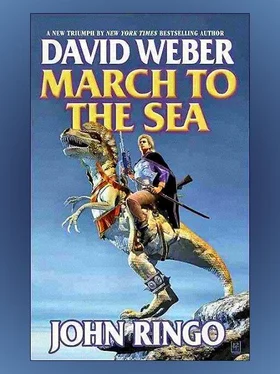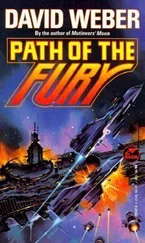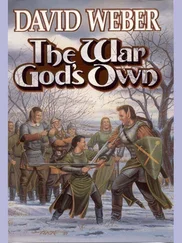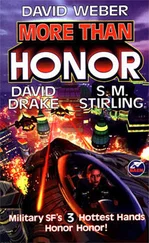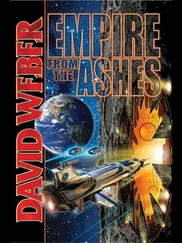David Weber - March to the Sea - Empire of Man Book II
Здесь есть возможность читать онлайн «David Weber - March to the Sea - Empire of Man Book II» весь текст электронной книги совершенно бесплатно (целиком полную версию без сокращений). В некоторых случаях можно слушать аудио, скачать через торрент в формате fb2 и присутствует краткое содержание. Жанр: Фантастика и фэнтези, на английском языке. Описание произведения, (предисловие) а так же отзывы посетителей доступны на портале библиотеки ЛибКат.
- Название:March to the Sea - Empire of Man Book II
- Автор:
- Жанр:
- Год:неизвестен
- ISBN:нет данных
- Рейтинг книги:5 / 5. Голосов: 1
-
Избранное:Добавить в избранное
- Отзывы:
-
Ваша оценка:
- 100
- 1
- 2
- 3
- 4
- 5
March to the Sea - Empire of Man Book II: краткое содержание, описание и аннотация
Предлагаем к чтению аннотацию, описание, краткое содержание или предисловие (зависит от того, что написал сам автор книги «March to the Sea - Empire of Man Book II»). Если вы не нашли необходимую информацию о книге — напишите в комментариях, мы постараемся отыскать её.
March to the Sea - Empire of Man Book II — читать онлайн бесплатно полную книгу (весь текст) целиком
Ниже представлен текст книги, разбитый по страницам. Система сохранения места последней прочитанной страницы, позволяет с удобством читать онлайн бесплатно книгу «March to the Sea - Empire of Man Book II», без необходимости каждый раз заново искать на чём Вы остановились. Поставьте закладку, и сможете в любой момент перейти на страницу, на которой закончили чтение.
Интервал:
Закладка:
The other basis was mining. The mountains were a major source of gold, silver, and iron. There were also small concentrations of gems scattered through the hills around the city, most in alluvial deposits. The combination made Ran Tai a rich, if harsh, town.
But it was a town with a problem.
"Maybe there's been a change in the weather patterns," O'Casey said, shaking her head. "That's one of the few things I could think of that would explain invasions on the scale these people seem to be talking about."
"We don't want to have another set-to with the Kranolta," Roger said definitely.
"Oh, Satan, no," Kosutic agreed, rubbing the still-fresh scars on her arm. "I'd rather go toe-to-toe with a Saint strike force than face up to those Kranolta bastards again. The damned Saints at least know when they're beat."
"Well, these aren't like Kranolta, exactly," O'Casey told her. "Or not like our Kranolta, anyway. The Kranolta were a fading force by the time we met them. From the description, these seem to be more like the Kranolta when they first swarmed over Voitan."
"Oh, great!" Julian gave a slightly hysterical chuckle. "New, fresh Kranolta instead of tired, worn-out Kranolta!"
"This group," O'Casey went on, "is apparently coming from the same hill country up on the edge of the northern plains that the Kranolta spread from, but the Kranolta found a gap in the mountain barrier over here, where it flattens out to the east." She gestured at the low detail map, pointing at the far northern region of the huge continent they had been crossing and tracing the dividing mountain range Sen Kakai had called the Tarstens with a fingertip.
"These Boman are pretty much more of the same, but they seem to be distinct from them in several ways. The most obvious one, of course, is that they haven't found a way around the Tarstens-they seem to have hit the range and slid along it to the west, instead. They also seem to have started their migration somewhat later than the Kranolta, and their weaponry is significantly different. The Kranolta didn't have gunpowder, but at least some of these Boman use arquebuses, although I suppose they might have gotten them from trading with this area.
"Actually, the Boman-like the Kranolta-seem more like a loose confederation of tribes than anything we might call a unified force, and there appear to be varying levels of technology among different tribes. For example, the tribesmen who apparently act as the leading edge of their movement are considerably more primitively armed than what we might call the 'core' tribes who give their invasion its real weight, with traditional muscle-powered projectile weapons instead of firearms. You might think of them as, um ... skirmishers, I suppose. Lightly armed and expendable, filtering forward like tentacles to feel out the local opposition and opportunities."
"Great," Pahner said with a dry chuckle. "More Fuzzy-Wuzzies and their shovel-headed spears. So what's driving them? Why have they begun their invasion now? When we're passing through?"
"I can't tell you that," the historian admitted, shaking her head. "Certainly not with any degree of confidence. The motivations of barbarian expansions aren't always clear, but I wasn't joking when I said that there may have been a change of weather. On the other hand, it could be simply a matter of a particularly effective tribal leader looking to carve himself the local equivalent of a Mongol empire. Or it could be that a climate shift has permitted them a higher than normal reproductive rate, providing an expansion in military age manpower. Or it could be the converse-a weather shift which is putting a squeeze on their ability to feed their people where they are and fueling a survival-oriented migration." She shrugged. "Whatever's causing it, they're sweeping down through this region, crushing everything in their path and pushing other tribes ahead of them."
"Which is why the guard was so nervous," Roger said, taking a bite out of something the natives called a targhas and which seemed to fill the same niche the ubiquitous kate fruit had filled on the southern side of the Tarsten Mountains. The company had become very fond of the kate fruits, but the kiwi-dates seemed unknown in this region, as did dianda. Barleyrice, luckily, was common to both sides of the mountain range, but Roger already missed the kates. The targhas had a completely different taste and texture-more like a persimmon crossed with a hairy-skinned crab apple-and he wondered what the troops would dub this one. Persapples? Crabsimmons? Apsimons?
"They've probably got raiders coming up from the jungle as these new barbarians push in," he continued, "and eventually, the Boman themselves are liable to get down here, as well."
"We need to resupply." Pahner looked over at Poertena. "Is that going to be a problem?"
"I been checkin' prices in tee market." The armorer shook his head. "We can get good prices for tee dianda. Goood prices. But tee barleyrice is all brought up from tee jungle." He shook his head again. "Food 'round here is expensive."
"So we buy what we need to get to the jungles, then buy the rest down on the plains," Pahner said, then paused as the armorer shook his head. "No?"
"They harvests is po-messed up." The Pinopan shrugged. "Barleyrice is hard to find, even down on tee plain. We walkin' into another war, Cap'n. Food, it's gonna be hard to find."
"Wonderful." The captain sighed and looked at the ceiling. "Just once, could something go right?" he asked God.
"If it did, you'd figure there was a catch," Roger told him. "Okay, so the bottom line is that we need more cash?"
"We could use it, yes, Sir," the Pinopan said. "Tee barleyrice is gonna be expensive, and t'at don't count tee fruit or spices."
"I would like to get quite a bit of those," Matsugae said. Roger's valet usually attended these meetings, partly to make sure that everyone had refreshments, but also as the expedition's head cook and true logistics manager. "The nearpeppers in the markets around here are absolutely fabulous. Also, there are some other spices that I'd like to get a few dozen kilos of. I've already spotted some very good dishes that I want to try. And we should also think about hiring some camp help, even if they're not mahouts."
"That takes cash, Matsugae," Pahner said pessimistically. "If we hadn't had to buy the flar-ta, it would be one thing. But the treasury's pretty bare. We have enough for now, but there's no apparent source in the future."
"So we raise some cash." Roger shrugged. "We've been doing that all along."
"I hope we're not going to have to take any more towns," Gunnery Sergeant Lai said. "The last one was bad enough for me."
"No towns," Roger agreed. "But," he continued, sitting up, "we need money, and we're a top-notch combat unit. There's a massive migratory movement going on, and lots of fighting because of it. There should be a high-paying mission around here that we can do with minimal casualties."
"You're talking about becoming mercenaries," Pahner said incredulously.
"Captain, what else were we in Marshad? Or, for that matter, Q'Nkok?" the prince asked with a shrug.
"We were Bravo Company of the Bronze Battalion," the captain replied with a tight smile, "forced by circumstances to fight. Then taking payment for services rendered because it made sense to. We were not common goddamned mercenaries!"
"Well, Captain," Roger said quietly, "do you have a better alternative?"
The Marine started to open his mouth, then closed it with a snap. After a moment, he shook his head.
"No. But I don't think we've sunk low enough to be mercenaries."
"Poertena," Roger said. "Do we have the funds to buy enough barleyrice to make it to the coast?"
The armorer looked from the prince to his company commander wildly. "Hey, You' Highness, don' get me in t'is!"
Читать дальшеИнтервал:
Закладка:
Похожие книги на «March to the Sea - Empire of Man Book II»
Представляем Вашему вниманию похожие книги на «March to the Sea - Empire of Man Book II» списком для выбора. Мы отобрали схожую по названию и смыслу литературу в надежде предоставить читателям больше вариантов отыскать новые, интересные, ещё непрочитанные произведения.
Обсуждение, отзывы о книге «March to the Sea - Empire of Man Book II» и просто собственные мнения читателей. Оставьте ваши комментарии, напишите, что Вы думаете о произведении, его смысле или главных героях. Укажите что конкретно понравилось, а что нет, и почему Вы так считаете.
